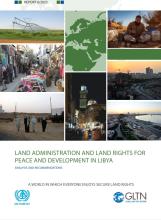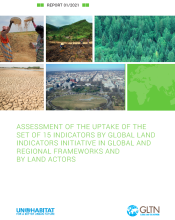Land Library
Bem-vindo à Biblioteca do Land Portal. Explore nossa vasta coleção de recursos de acesso aberto (mais de 74.000), incluindo relatórios, artigos de revistas científicas, trabalhos de pesquisa, publicações revisadas por pares, documentos jurídicos, vídeos e muito mais.
/ library resources
Showing items 1 through 9 of 383.This report is a contribution towards the improvement of land management and land administration in Libya.
In the next 30 years, Africa’s population is expected to double, and the continent will be home to 2.5 billion people. Almost half of this population will be living in urban agglomerations.
To ensure a better and more sustainable future for all, the 2030 Agenda for Sustainable Development (“the 2030 Agenda”) has identified 17 Sustainable Development Goals (SDGs) to be achieved by 2030.
The Global Land Indicators Initiative (GLII) platform was established in 2012 through the joint effort of United Nations Human Settlements Programme (UN-Habitat), the World Bank and Millennium Challenge Corporation with the aim of making global-scale monitoring of land governance a reality by 202
The paper critically engages with sustainable development goal targets (SDG-2- Target 2.3; SDG-5) to examine how and why large-scale agricultural land acquisitions modify the social relations of women’s food access.
This policy brief provides details of the United Nations Special Rapporteur recommendations regarding how governments can upgrade informal settlements within a human rights-based framework.
Despite an inflow of investment in rural communities, there are concerns about negative impacts on local people’s livelihoods, access to farming land, productivity, income levels, food security and access to social services.
The movement to secure women’s land rights in Senegal needs to take into account the rights of all sections of the targeted communities. Hence, the cases presented testify to specific situations along with evaluations of initiatives targeting improvement of women’s land rights.
Government intervention and local level coordination of large-scale investment decisions are important components required for positive impacts on food security, nutrition and livelihoods of host communities.








